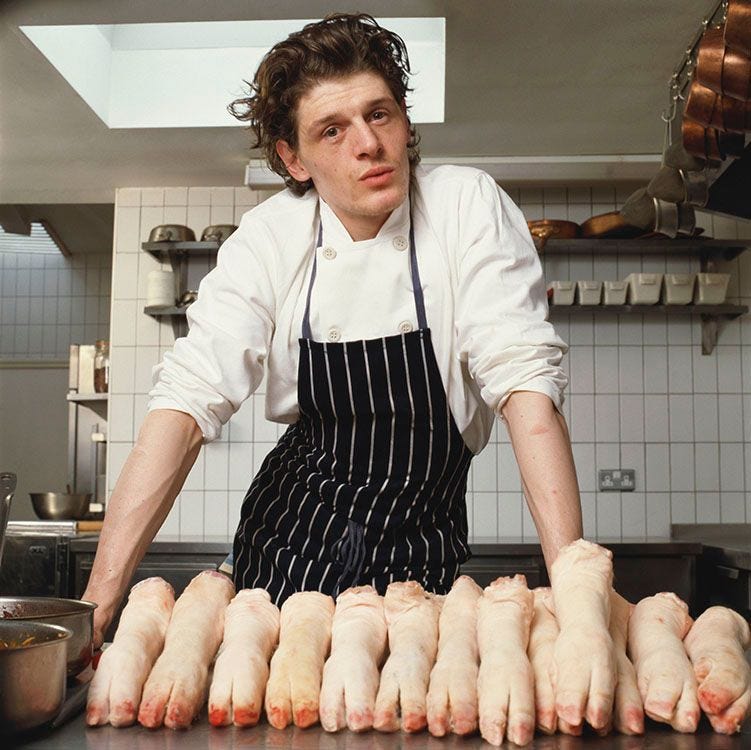A song that I came across this year and have grown fond of is "3 options" by Persian Empire.
The mellow rhythms of the song complement the contemplations of chef and restaurateur Marco Pierre White regarding his choices at a particular stage in his vocation. Here are the lyrics:
And so then
I was no longer happy
I had three options
Option one
Continue working six days a week
80, 90 hours a week
You leave home in the morning and your children are sleeping
You go home at night and your children are sleeping
You're exhausted on a Sunday
But you retain your status
Your income, your position within the industry
That's option one
Option two
Live a lie
Pretend I'm behind the stove
Pretend I still cook
Continue to charge high prices
And question my integrity
And everything that I ever worked for
Option three
Pluck up the courage
To take your apron off
Hang it up
Give Michelin back their stars
Accept tomorrow
That you're unemployed
You have no status within our industry
They were my three options
Option one leads to burnout, option two leads to being out of integrity, and option three leads to diminished status and unclear livelihood prospects. None of these options feel good. With option space mapping for complex life situations, none of the initial options will feel good. I call these situations "existential knots" (x-knots), which I defined before as:
An existential knot is an issue that feels deeply personal, most saliently experienced in the felt-sense, accompanied by great difficulty in coherently describing what the issue is. The person’s mental models are extremely entangled, with thought loops that lead to difficult emotions. When trying to “solve” the issue they are met with disappointment and confusion. When trying to inquire into it on their own they are met with frustration and a sense of stuckness. The common reaction is to escape into some kind of cope. If the existential knot is left tied, an “existential crisis” awaits.
In a philosophical inquiry, once I understand the propositional and felt-sense contours of an x-knot, I like to map the option space. For example, in my previous entry, I summarized the option space I see to close the "vocation gap." I believe my option space mapping with this life challenge is robust, mainly because it is informed by many years of personal experiments and thoughtful consideration, along with having hundreds of inquiries in my philosophy practice on this issue.
However, most mapped option spaces will initially be incomplete, mainly because they will be limited by what is known as "bounded rationality," people making choices with constraints on the information available, their cognitive abilities, and time. Regardless of whether the initial option space map lacks or contains "category errors,"1 which it surely will, I consistently advise developing one as a starting place for any practical philosophical inquiry.
If the option space is bothersome, and one feels that they will lose all around, as White's option space did for him, then the next artful move is to stay with the bother. Bothersome things are unpleasant to stay with. In this point of an x-knot inquiry, I combine Stoic negative visualizations with "part works" to examine the worst-case scenario. The former looks at the worst thing that could happen by choosing each option, and the latter allows any unmet "subpersonalities"2 to share their opinions and be fully accepted.
Typically, when persevering through the bother, the option space expands, revealing category errors and prompting the adjustment of subtle perspectives. If the option space is still confusing, an inquiry into aspirational "values"3 will be needed. If the option space is still bothersome, an inquiry into exercising "virtues,"4 such as courage, is required. Once an option space is thoroughly examined and the bothersome essence is removed, one can be creative again. Creativity cannot flourish within a bothersome body.
I see an examined and unbothered option space as a good creative constraint. We need constraints to express our creativity, whether through a canvas, camera, or a Substack; limits of what can be created are necessary to create something. Indeed, excessive constraints can feel stifling, but an absence of constraints will result in a lack of creativity altogether.
Philosophical inquiry is an art form, and I agree with philosopher Michel de Montaigne that it is the "most valuable of all arts, the art of living well." For all aspiring artists of life, the constraint that comes from having an option space is required, enabling us to create a more beautiful life.
If you’d like to engage in some option space mapping with me, click the button below:
If you’d like to get a sense of what philosophical inquiry with me will be like, this playlist captures the vibe:
Less Foolish is funded by its readers, and I endeavor to keep most of the content accessible to everyone. If you wish to contribute to my work, you might consider subscribing, whether for free or as a paid member, and sharing this post with those you sense will resonate.
If you have additional insights on creative constraints or mapping option spaces, please share your thoughts by leaving a comment.
A “category error” is a semantic or ontological mistake in which something is mistakenly placed into a category to which it does not belong. It involves a misunderstanding of the appropriate categories or classifications of objects or concepts.
“Subpersonalities” are distinct personality modes that temporarily emerge in an individual to help them cope with specific situations, influencing their thoughts, emotions, and behaviors.
I define virtues as values that are always good.


